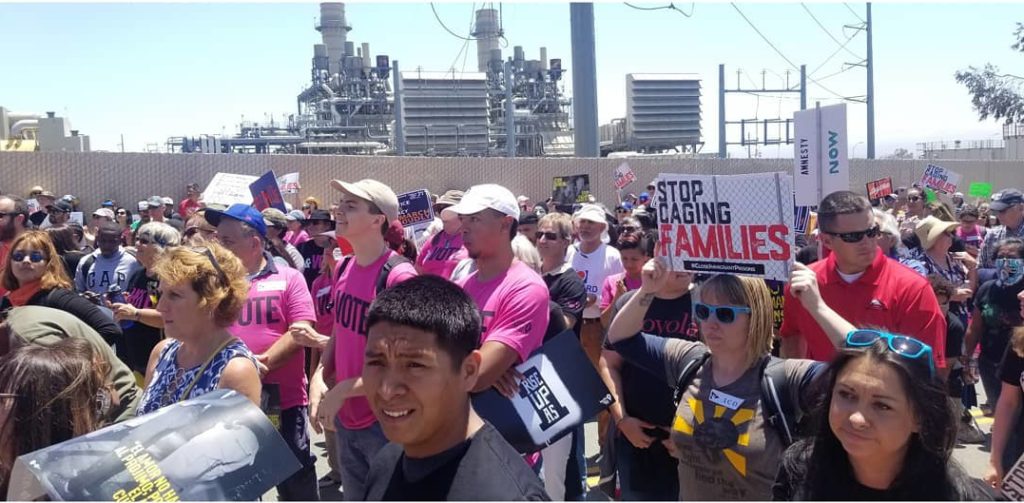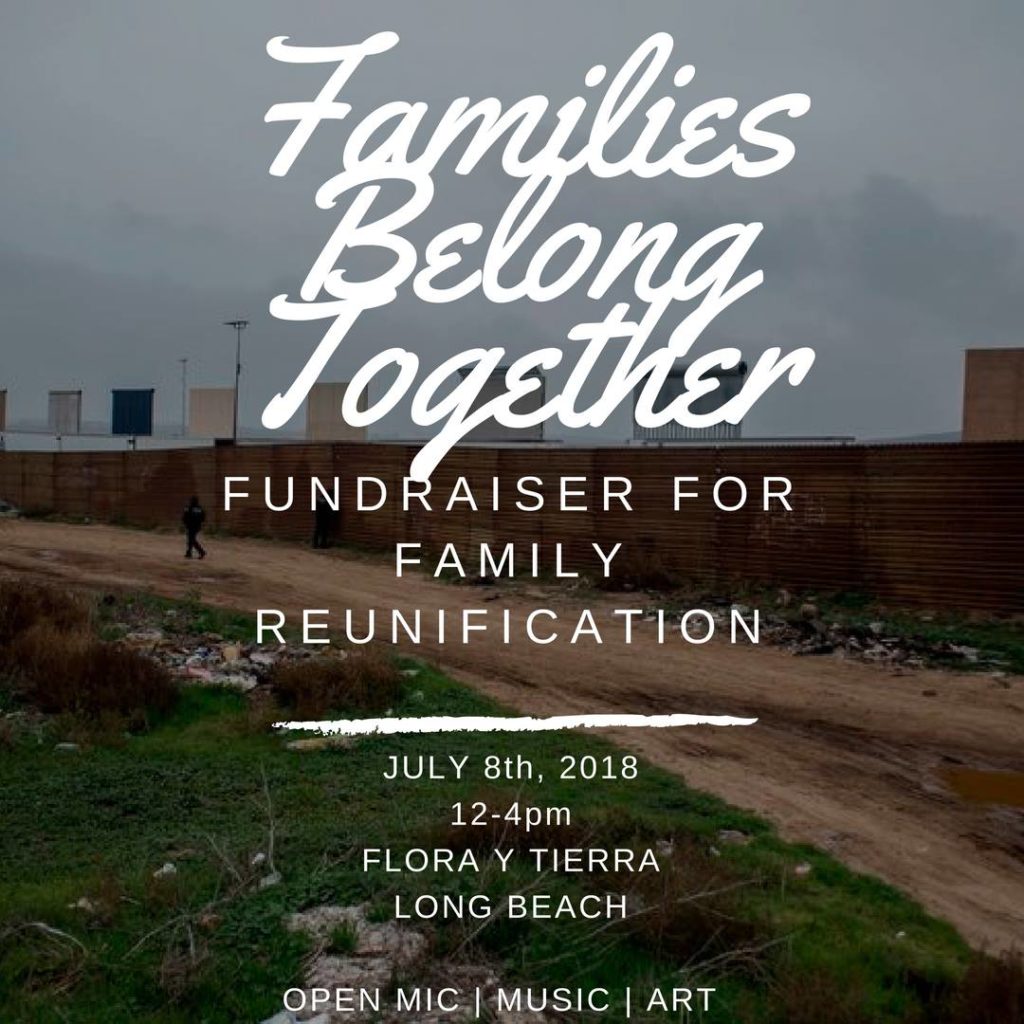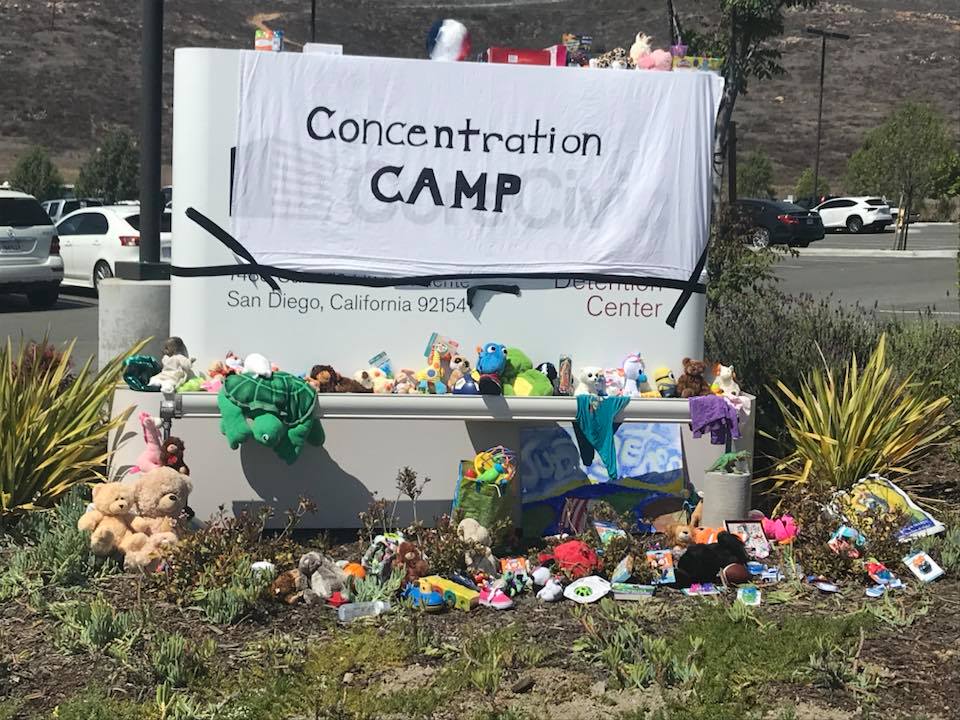Long Beach at the Border: Dispatch from the Otay Mesa Detention Center Protest
by Erin Foley | Published July 6, 2018 in Perspectives
10 minute readWhen I saw that a bus was being chartered to take people down to a migrant detention facility on the border of California and Mexico last week, I jumped at the chance to go. The bus was paid for by First District Councilmember Lena Gonzalez, which kind of surprised me. The action was brought to my attention by my dear friend and fellow community organizer, Andrea Donado—which did not surprise me at all.
Andrea, a wonderful soul who immigrated here from Colombia, is a tireless supporter of immigrant rights. She works for a local non-profit, ICO (Interfaith Community Organization), and I knew the Sessions-written policy mentioned in the quote above had fired them up. Though I didn’t know what the action was really going to entail, I went to help raise awareness and show support for the families being ripped apart.
The morning of I could not help but note that I did not see any councilmembers. I was not the only one who had thought they would be there since they chartered the bus. I did see Andrea and ICO, along with people from the Long Beach Gray Panthers and various other active community members such as my friends Elliot Gonzales and Kelli Curry.
We embarked on our chartered bus journey down to the San Diego County area at around 9:45 a.m. and arrived at Our Lady of Mount Carmel Catholic church in San Ysidro around 11:45 a.m. There we met the other groups from ICO’s umbrella organization, PICO California (soon to be renamed Faith In Action). Our friend Jewell Faamaligi also met us there.
At the church were tables with stacks of T-shirts and printed signs saying “Stop Caging Families,” “All Rise As One,” and “Schools Not Prisons.” As I began to make my own sign I noticed the army-green jacket I was wearing resembled the now-infamous Melania Trump “I don’t care, do you?” jacket she had worn on her way to visit migrant children at the Texas-Mexico border. As a response to that fashion faux pa I made a sign that read, “I really care, don’t you?” and I pinned it to my backpack.
Our group divvied up the last of the food left from lunch and ate quickly before heading back to our bus parked next to three others, along with many cars belonging to people who had driven themselves. Folks had come from northern California, Los Angeles, and Long Beach, as well as other nearby areas. Our caravan of vehicles traveled en masse a few minutes down the road to the Otay Mesa Detention Center in San Diego owned by private prison company CoreCivic (formerly the Corrections Corporation of America), which has thrived under the Trump Administration. Just this year, it’s share’s rose 4.8 percent.
We parked around the corner and when I got off the bus I saw priests, rabbis, pastors, families with small children, teenagers, elderly folks—people of every background. We began walking down a desolate, industrial road and, at the behest of one preacher, we immediately began chanting that we had come “in discipline and love” and then on to the usual, “Whose streets? Our streets!”—“No justice, no peace!”—“Un pueblo unido, jamas sera vencido!” (“The people united can never be defeated”)—“Immigrants are welcome here!” and so on.
We turned the corner and there was the detention center, barbed wire-enclosed and painted institutional tan. We yelled out, “Estamos aqui! No estan solos!” (“We are here! You are not alone!”).
Tomisin Oluwole
Dine with Me, 2022
Acrylic on canvas
36 x 24 inches
Click here to check out our interview with Tomisin Oluwole, a literary and visual artist based in Long Beach.

Instead of gunking up our site with ads, we use this space to display and promote the work of local artists.

Then at one point, the crowd grew quiet, and I realized it was because we could hear voices from the other side of the detention center wall. The whole mood of the crowd seemed to shift from defiant to serious. I could not make out the words, but I could hear them. I could hear the voices of the imprisoned. I could hear the people who suffered to get here still suffering, and I was not prepared. The realness completely smacked me in the face. I thought of how heartbreaking it would be for any parent to have their children ripped from them. I thought of how heartless Donald Trump and his administration were to come up with their “Zero Tolerance” policy. The tears were unstoppable … but I reminded myself that my tears would do very little to help them. (Get it together, Erin.) My voice broke as I yelled out again and again, “Estamos aqui! No estan solos!” If nothing else, we were there to let them know that we were watching and fighting—they were not alone.
We continued marching, towards a crowd of over a thousand being addressed by clergy from the platform of a flatbed truck. We prayed, got more fired up, and cried more. We then marched back towards the detention center sign in front of the fence, and I watched as organizers threw a white sheet over it. On it were the words “Concentration Camp.” Several people came forward and placed children’s toys and stuffed animals at the base of the sign. I was told that clergy members wearing orange wristbands crossed the property line to firmly stand on detention center property.
We continued marching back down the street towards our buses. Before we could get to the intersection near our vehicles, a freestanding gate had been placed in the middle of the road and I realized several people had chained themselves together and to the fence. I heard someone yell out that only people who supported the immigrants’ rights would be allowed to pass. As we were being shuffled back to the bus I was conflicted because I felt compelled to stay near the protesters taking direct action, but also to find my group as I had been separated from them and was not sure if they were back on the bus or not. I had assumed everyone was all in it together, but back at the bus I found out that the ones who had chained themselves were not connected to ICO or PICO, and based on their actions, the civil disobedience that the clergy members had planned to take was changed.
After we boarded the bus, we went back to the Catholic Church in San Ysidro for a closing discussion. There it was noted that the clergy members had decided not to continue their direct action on the detention center grounds. They were concerned by the direct action of the protestors. They felt that the bail money that would have been put up for them would be better used for the immigrants that were imprisoned. We applauded the clergy for their efforts, we applauded each other for showing up. One of the lead organizers then asked, “What is one thing you can do now to help?”
I wasn’t really sure how to answer. It all feels so sad and overwhelming. But I decided that one thing I could at least do was share my experience. I don’t really know that us going there changed much—but letting the detained immigrants know that they were not alone made the event feel useful to me. Still, I knew this was only the first step. It would only be truly useful if we continued to stay active in the fight to reunite the families who have been torn apart.
We were asked to say one word that describes how we were each feeling at that time. Many words flashed through my head—heartbroken, inspired, sad, overwhelmed—but when they came to me the one I chose was “committed.” I am committed to seeing this through, to not letting up, to finding more ways to be useful in the struggle, to not let these asylum seekers so far from home be left all alone. I don’t know how to fix this but in the coming weeks, months, years, I will keep doing what I can, when I can, the best I can. I hope more and more people will do the same. El pueblo unido, jamas sera vencido…
On that note, Flora Y Tierra, located at 811 E. 7th St., along with Oak Tree Familia will be hosting the Families Belong Together Fundraiser for Family Reunification on Sunday, July 8 from 12 – 4 p.m. The event will feature an open mic, art raffle/silent auction, food vendors, sign and poster making, button making (with yours truly, for a $1 donation), and info on how you can help the cause. All proceeds will go toward helping to reunite families. Please join us – if you can’t, please use your own means and skills to help in other ways.

Help Us Create An Independent Media Platform for Long Beach
We believe that what we are trying to do here is not only unique, but constitutes a valuable community resource. We are dedicated to building a fiercely independent, not-for-profit, and non-hierarchical media organization that serves Long Beach. Our hope is that such a publication will increase civic participation, offer a platform to marginalized voices, provide in-depth coverage of our vibrant art scene, and expose injustices and corruption through impactful investigations. Mainly, we plan to continue to tell the truth, and have fun doing it. We know all this sounds ambitious, but we’re on our way there and making progress every day.
Here’s what we don’t believe in: our dominant local media being owned by one of the city’s wealthiest moguls or a far-flung hedge fund. We believe journalism must be skeptical and provide oversight. To do so, a publication should remain free from financial conflicts of interest. That means no sugar daddy or mama for us, but also no advertisements. We answer to no one except to our readers.
We call ourselves grassroots media not only because we are committed to producing work that is responsive to you, dear reader, but because in order for this project to continue we will also need your support. If you believe in our mission, please consider becoming a monthly donor—even a small amount helps!


 erin@forthe.org
erin@forthe.org




